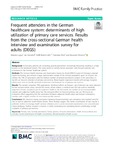Frequent attenders in the German healthcare system: determinants of high utilization of primary care services. Results from the cross-sectional German health interview and examination survey for adults (DEGS)
Luppa, Melanie
Giersdorf, Jan
Riedel-Heller, Steffi
Prütz, Franziska
Rommel, Alexander
Background
In Germany, patients are consulting general practitioners increasingly frequently, resulting in a high burden on the healthcare system. This study aimed to identify factors associated with frequent primary care attendance in the German healthcare system.
Methods
The German Health Interview and Examination Survey for Adults (DEGS) is part of Germany’s national health monitoring, and includes a large representative sample of the German population aged 18–79 years. We defined the 10% of participants with the highest number of general practitioner contacts in the preceding 12 months as frequent attenders of primary care services. Binary logistic regression models with average marginal effects were used to identify potential determinants for frequent use of primary care services.
Results
The sample comprised 7956 participants. Significant effects on frequent use of primary care were observed for low socioeconomic status, stressful life events, factors related to medical need for care such as medically diagnosed chronic conditions and for subjective health. In the full model, the number of non-communicable diseases and subjective health status had the strongest effect on frequent primary care use. We found an interaction effect suggesting that the association between subjective health status and frequent attendance vanishes with a higher number of non-communicable diseases.
Conclusions
We observed strong associations between frequent primary care attendance and medical need for care as well as subjective health-related factors. These findings suggest that better coordination of care may be a preferred method to manage health services utilization and to avoid redundant examinations and uncoordinated clinical pathways. Further research is needed to clarify moderating and mediating factors contributing to high utilization of primary care services.
Files in this item

